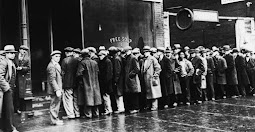Someone told me they believed the balance of power
between white Americans and Black Americans has evened out since the 1960’s.
After all, laws have been passed to reduce discrimination, right? There's more crime in Black-populated communities! And, for
goodness sakes, we even elected a Black man to the presidency! So, how in the
world is it that anyone believes that Black Americans are still oppressed?
Simple (or maybe, more accurately, not so simple): a system’s balance of power doesn’t even out in
a lifetime.
Or even many lifetimes.
And that power structure started with the first vile act of oppression.
A brief history:
Africans were ripped from their lives and enslaved (as, too, were Indigenous Americans, which is a topic for another day). Then, despite centuries of dehumanization and abuse—and with, because
of the abhorrent system, little to no opportunity for education, community, or
financial gain--their descendants persevered. The traitorous Confederacy (proclaiming
Blacks were inferior and should be enslaved) lost, finally bringing those in
enslavement the most basic of human rights, freedom.
But freedom isn’t equality.
Suddenly, there were 12% more free people in the US, Americans who,
within the system, had no homes, no finances, and little education. The vast
majority were relegated to living in poverty. The “system” didn’t help.
Governments codified discrimination via Black Codes and Jim Crow laws, which—especially
when combined with persisting attitudes and perceptions—denied educational,
housing, voting, and job opportunities to Black Americans (who, because of skin
color, were easily singled out). By the time of the Civil Rights push in the
1960s, Black Americans had already endured generations of inequality in the
system which generally led to less opportunity for things such as education and
financial gain (note: the wealth gap between Black Americans and white Americans continues to increase). Laws designed to reduce disparity and discrimination were passed, but racist
and discriminatory attitudes persisted. And they still do. Generations of such policies and
treatment that limit opportunity often lead to poverty, which, studies show, is
a very difficult inheritance to overcome.
It's true that a higher percentage of people in poverty commit more crime than those not in
poverty—regardless of ethnicity—often due to the psychological effects of
hopelessness and desperation. Desperate, hopeless people sometimes also turn to
drugs, which fuels their own criminal actions as well as that of a community’s
drug trade and influence.
Sometimes, crime, instead, is a reaction to a perception of systemic inequality
in things such as law enforcement and justice (such as in the summer of infrequently violent protests in reaction
to the police murder of George Floyd in Minneapolis).
And the system reinforces that perception. Those with less
education—which correlates directly with poverty—receive longer jail sentences for the same crimes than
those with more, likewise as do Black Americans compared to white
Americans.
Even not-in-poverty Senator Tim Scott has discussed his experiences
with systemic racism, including discriminatory judgments towards him from
Capitol police or times (as an elected official) he was stopped for “nothing more than driving a new car
in the wrong neighborhood, or some other reason just as trivial.”
Regarding Obama’s election, which some say proves there is
no racism in America, studies show his mere presence in the White House
actually increased polarization along racial lines (he lost the white American vote by
12 points in 2008 and 20 points in 2012). In 2016, Clinton’s position as a champion for
racial equality swung even more such voters to Trump.
Obviously, systemic racism is still here. And despite what some politicians and their followers insist, Black Americans aren’t the ones pulling
the strings. Ingrained societal perceptions and long-time “norms” set up and
perpetuated by the white American majority are doing that. Similar patterns are found in
the histories of traditionally oppressed people throughout the world.
And personal racism is here, too. In 2020, for example, the
FBI noted a 40% increase in hate crimes toward Black Americans. Black Americans are still the number one target of hate crimes.
So, whether or not someone chooses to believe that racism towards
Black Americans—in policies and attitudes—exists in the United States, research and
history prove that, so horribly, it does.










